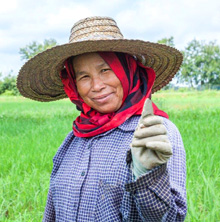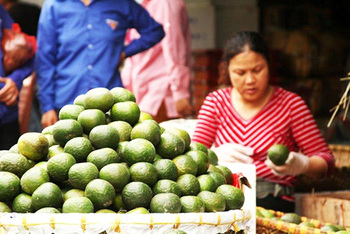ASEAN Sustainable Agrifood Systems (SAS)
Project description
Title: ASEAN Sustainable Agrifood Systems (SAS)
Commissioned by: German Federal Ministry for Economic Cooperation and Development (BMZ)
Country: ASEAN Member States – in particular Cambodia, Viet Nam, Thailand, Lao People’s Democratic Republic, Myanmar, Indone-sia, the Philippines and India
Lead executing agency: ASEAN Secretariat
Overall term: 2013 to 2019

Context
The agrifood sector is one of the most important engines of economic growth in the ASEAN region. An ever-increasing demand among consumers for high-quality foodstuffs is driving regional and national agricultural policies to focus on the concept of sustainability. At the same time, ensuring safe, healthy and affordable food for a growing population requires the activities of all actors along various value chains – from suppliers and farmers to processors and retailers – to be profitable.
The ASEAN Sustainable Agrifood Systems (SAS) project builds on experience gained from the predecessor project, ASEAN Biocontrol, and is one of the two modules under the ASEAN-German Programme on Response to Climate Change: Agriculture, Forestry and Related Sectors. Whereas the predecessor project focused on promoting sustainable agricultural production, the current project is working to advance the agrifood sector along entire value chains in the rice, vegetable, fruit and coffee sectors. This includes factors such as further processing and market linkages for smallholder households. With regard to agricultural production, further topics – for example soil and nutrient management and farm economics – have been added to the ongoing work on biological control agents.
Objective
Strategies and guidelines of the ASEAN (Association of Southeast Asian Nations) Member States in the area of sustainable agrifood systems are implemented at national level. National policy strategies are being harmonised in a single market (ASEAN Economic Community). The development and institu-tionalisation of satellite-based crop insurance policies help to make farmers more resilient.

Approach
Project management is the responsibility of GIZ Thailand, which is implementing the project in cooperation with institutional partners such as ministries of agriculture and project partners from the public-private RIICE (Remote Sensing-based Information and Insurance for Crops in Emerging Economies) partnership. The international RIICE partners include DEZA, sarmap, IRRI and Swiss Re. Additional project offices in Cambodia, Indonesia, Viet Nam and India are implementing the activities at national level. Regional and national dialogue forums provide Member States with a platform to share lessons learned. The project works in four fields of activity:
Policy frameworks
The project primarily advises ASEAN Member States on the policy and decision-making process, especially with regard to cross-border processes and political dialogue between the Member States.
Implementation of production technologies
The project supports selected approaches to sustainable production, based on crop protection, soil and nutrient management and farm economics.
Production risks and crop insurance
The introduction of national crop insurance policies for rice farmers is supported by using satellite data, for example.
Market access and capacity building
The project strengthens the capacities of decision-makers at all levels and promotes cooperation between small farmers and the private sector within sustainable value chains. Sustainable agrifood models are implemented in pilot measures, thereby enabling experiences to be incorporated into policy consultations. The project enhances the capacities of political decision-makers, farmers and private stakeholders in the area of crop insurance.
Results
A total of around 125,000 smallholder households have directly benefited from nearly 60 partnerships with the private sector and cooperation arrangements with other public-sector partners. In addition, almost 17,000 governmental officials, political decision-makers and other partners have so far received training, learning to implement ASEAN requirements at national level and to strengthen sustainable agricultural production. A positive development towards more sustainable agriculture can be seen in individual Member States in ASEAN's regional ratification of the two policy guidelines that the project supports.
In 2017, the number of biological crop protection products registered substantially increased in several Member States of the ASEAN Community. The introduction and demonstration of new production methods have particularly benefited the less developed countries.
The expansion of the project to include the ‘Production risks and crop insurance’ field of activity is helping to improve the economic situation of small farmers and make them more resilient to extreme weather events. Altogether, more than 300 employees of governmental institutions and agricultural research centres have been trained in analysing satellite data. This includes information about where and how much rice is cultivated, how the crops develop and the harvest to be expected. Thanks to prompt satellite monitoring, authorities are able to make predications regarding crop failures and take measures to counteract them where necessary.
In addition, they can support and compensate rice farmers who have lost their harvest or seeds at an early stage due to extreme weather events. In the Indian state of Tamil Nadu, the RIICE technology made it possible in 2015 to quickly and simply compensate more than 22,500 farmers for crop failures due to drought. As a result, the farmers were able to cultivate more rice again in the same season.